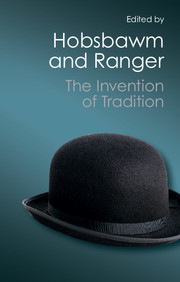Book contents
- Frontmatter
- Contents
- Contributors
- 1 Introduction: Inventing Traditions
- 2 The Invention of Tradition: The Highland Tradition of Scotland
- 3 From a Death to a View: The Hunt for the Welsh Past in the Romantic Period
- 4 The Context, Performance and Meaning of Ritual: The British Monarchy and the ‘Invention of Tradition’, c. 1820–1977
- 5 Representing Authority in Victorian India
- 6 The Invention of Tradition in Colonial Africa
- 7 Mass-Producing Traditions: Europe, 1870–1914
- Index
7 - Mass-Producing Traditions: Europe, 1870–1914
Published online by Cambridge University Press: 05 July 2014
- Frontmatter
- Contents
- Contributors
- 1 Introduction: Inventing Traditions
- 2 The Invention of Tradition: The Highland Tradition of Scotland
- 3 From a Death to a View: The Hunt for the Welsh Past in the Romantic Period
- 4 The Context, Performance and Meaning of Ritual: The British Monarchy and the ‘Invention of Tradition’, c. 1820–1977
- 5 Representing Authority in Victorian India
- 6 The Invention of Tradition in Colonial Africa
- 7 Mass-Producing Traditions: Europe, 1870–1914
- Index
Summary
Once we are aware how commonly traditions are invented, it can easily be discovered that one period which saw them spring up with particular assiduity was in the thirty or forty years before the first world war. One hesitates to say ‘with greater assiduity’ than at other times, since there is no way of making realistic quantitative comparisons. Nevertheless, the creation of traditions was enthusiastically practised in numerous countries and for various purposes, and this mass-generation of traditions is the subject of this chapter. It was both practised officially and unofficially, the former – we may loosely call it ‘political’ – primarily in or by states or organized social and political movements, the latter – we may loosely call it ‘social’ – mainly by social groups not formally organized as such, or those whose objects were not specifically or consciously political, such as clubs and fraternities, whether or not these also had political functions. The distinction is one of convenience rather than principle. It is designed to draw attention to two main forms of the creation of tradition in the nineteenth century, both of which reflect the profound and rapid social transformations of the period. Quite new, or old but dramatically transformed, social groups, environments and social contexts called for new devices to ensure or express social cohesion and identity and to structure social relations. At the same time a changing society made the traditional forms of ruling by states and social or political hierarchies more difficult or even impracticable. This required new methods of ruling or establishing bonds of loyalty.
- Type
- Chapter
- Information
- The Invention of Tradition , pp. 263 - 308Publisher: Cambridge University PressPrint publication year: 2012
- 62
- Cited by



